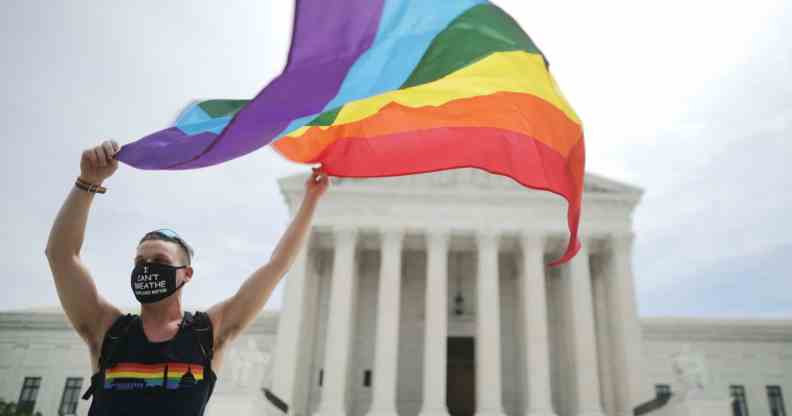LGBTQ+ Supreme Court case could ‘inflict irreparable damage’ on anti-discrimination law

A Pride flag flies outside the US Supreme Court. (Getty/ Chip Somodevilla)
On Monday (5 December), the Supreme Court will hear an LGBTQ+ case that could “inflict irreparable damage” on anti-discrimination law.
The Supreme Court is preparing to hear oral arguments in the case of 303 Creative v Elenis, brought by conservative website designer Lorie Smith.
Smith is a graphic designer who creates custom wedding websites in Colorado, and who first filed a lawsuit arguing that she should not have to create websites for same-sex couples in 2016, though she did not say that she had ever been asked to do so.
A five-year legal battle ensued, with Smith, backed by the anti-gay evangelical group Alliance Defending Freedom (ADF), arguing that Colorado’s anti-discrimination law violated her First Amendment free speech rights.
Having had her case thrown out time and time again, on Monday, 303 Creative v Elenis will be heard by the US Supreme Court.
Though there has been much furore in anti-LGBTQ+ circles around the idea of the Supreme Court supposedly “telling artists what to say”, that is not actually what is being argued.
Smith is well within her rights to broadcast her anti-LGBTQ+ beliefs around marriage but, under Colorado’s anti-discrimination law, she cannot refuse to sell a product to a customer because of their sexual orientation.
For example, if Smith were to create a website that declared “gay people are sinners”, that would be legal, but she would be required to create the same product for both straight and gay couples alike.
In a brief submitted on behalf of the respondents in the case, Colorado Solicitor General Eric Olson explained: The [Colorado’s Anti-Discrimination Act’s] objective is simple: to prevent sales discrimination by businesses that choose to sell their goods and services to the public… Once a company chooses to sell to the public, the Act ensures it sells to everyone regardless of protected characteristics.
“What a business chooses to sell to the public — including the design of its goods or services — remains entirely up to the business. The Act does not interfere with the Company’s choice to offer only websites of its own design, including those with biblical passages stating that marriage is a union of one man and one woman.
“The Act just requires that the Company allow potential customers to decide for themselves whether to buy such a website, rather than restrict sales based on a buyer’s protected characteristic. If the Company turns down a customer because of who they are, that violates the Act.”
But advocates are fearful of the repercussions if the court were to side with Smith, a possibility that seems increasingly likely considering its 6-3 conservative majority.
According to NBC News, ACLU lawyer Louise Melling warned that a win for Smith could impact other areas, for example healthcare, education and employment, adding: “If the court grants an exemption for what is deemed artistic and creative, the court has blown a big hole in our anti-discrimination principles.”
In an amicus brief, public accommodations legal experts wrote that “public accommodations laws regulate conduct, not speech”, and added: “Colorado has compelling interests in assuring full and equal access to the market and protecting dignity in commercial transactions… The Court should reject Petitioners’ position, which would inflict broad and irreparable damage upon the very architecture of anti-discrimination law.”
A group of LGBTQ+ organisations, including GLBTQ Legal Advocates and Defenders, the Human Rights Campaign, Lambda Legal, the National Center for Lesbian Rights, and the National LGBTQ Task Force, also filed an amicus brief.
“There is no limiting principle to Petitioners’ proposed exemption, which would equally jeopardize other groups and reintroduce the type of division and harm experienced in the past — and sometimes still — by Catholic, Irish, Asian, and Black people, women, and others,” they wrote.
“We urge this Court to preserve the principles of public accommodations that have protected these groups for many years, and to reject Petitioners’ proposed new rule that would undo the protections provided by public accommodations laws by legitimizing discrimination through the First Amendment.”

